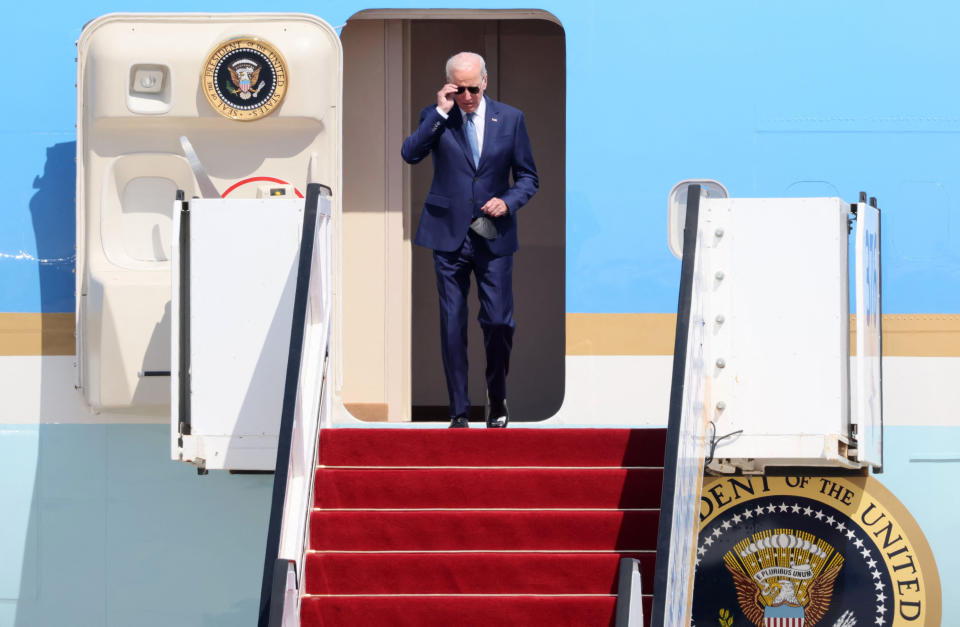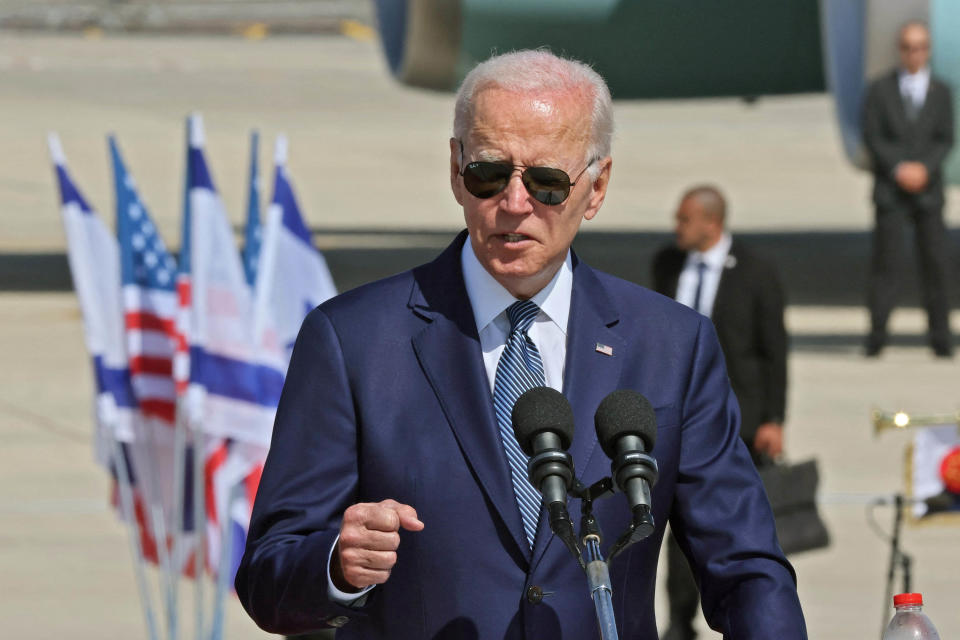Biden arrives in Israel, kicking off first Middle East trip as president
- Oops!Something went wrong.Please try again later.
JERUSALEM — President Joe Biden arrived in Israel on Wednesday for his first trip to the Middle East as president, looking to show support for that nation amid low expectations that his visit will lead to any fundamental shift in the growing tensions between Israelis and Palestinians.
While most presidents have centered their visits to the Jewish state around trying to help resolve the Israeli-Palestinian conflict, there are no indications from Biden administration officials that there are plans to do anything more than reaffirm Biden’s support for a two-state solution.
While Biden said he will discuss trying to reach a two-state solution, he acknowledged it is "not in the near term."
"Greater peace, greater stability, greater connection is critical," he said upon landing in Israel. "It’s critical, I might add, for all people of the region, which is why we’ll discuss my continued support, even though I know it’s not in the near term, a two-state solution, which remains in my view the best way to ensure the future of equal measure of freedom, prosperity and democracy for Israelis and Palestinians alike."
Instead, much of the emphasis ahead of the trip has been focused on improving relations between Israel and its Arab neighbors as part of Biden’s wider efforts to bring stability to the region and counter Iran’s growing nuclear threat. After two days in Israel and a visit to the occupied West Bank, Biden plans to travel to Saudi Arabia, where administration officials have indicated there may be some early steps toward publicly normalizing relations between Saudi Arabia and Israel.
“This may be the first presidential visit to Israel in history where the president doesn’t really have that deep of a policy agenda, and certainly not a real substantive one on the Israeli-Palestinian conflict or the peace process,” said Michael Koplow, chief policy officer at the Israel Policy Forum, a nonprofit group that advocates for a two-state solution. “While a presidential trip here is always exciting, I’m not sure that there’s going to be a huge amount that’s going to come out of this one with regard to Israeli-Palestinian issues that we haven’t seen before.”

One issue that will likely be discussed is allowing direct flights from Israel to Saudi Arabia for Israeli Muslims to make the hajj pilgrimage, as well as lifting other air restrictions for Israeli flights over the country, foreign policy analysts have said.
“Any normalization of any kind would be a long process, but looking for progress and momentum in that direction is certainly something we are focused on as we head off to the Middle East,” White House national security adviser Jake Sullivan said.
During the trip, Biden will be taking extra Covid precautions including minimizing contact and increasing mask use, White House press secretary Karine Jean-Pierre said. The highly contagious BA.5 variant, which is now the dominant strain in the United States, has driven up infections and hospitalizations.
Upon greeting Israeli officials on the tarmac in Israel, Biden gave out fist bumps rather than handshakes to those who extended an open palm, though he patted several officials on the shoulder as they conversed without masks and later shook hands with other Israeli officials.
Covid is largely spread through respiratory particles and public health officials have downplayed the role of surface transmission.
A day before Biden's departure, White House deputy chief of staff Jen O’Malley Dillon said in a tweet that she had tested positive for Covid. She had one socially-distanced and masked meeting with Biden on Monday, and he is not considered a close contact under CDC guidelines, she said.
The added precautions appear to be a shift from earlier in the week when Biden was shaking hands and posing for photos with guests on the White House South Lawn during the signing of new gun legislation.
Avoiding hand shakes could enable Biden to dodge a politically contentious photo op of shaking hands with Saudi Crown Prince Mohammed bin Salman, who the U.S. intelligence community concluded was behind the murder of Washington Post columnist Jamal Khashoggi, when he travels to Saudi Arabia on Friday.
Biden’s visit comes just weeks after a major upheaval in the Israeli government that unseated Prime Minister Naftali Bennett and triggered another Israeli election in November, the fifth in less than four years. Instead of meeting with Bennett, with whom administration officials had been working closely for the past year, Biden will sit down with the caretaker prime minister, Yair Lapid.

The uncertainty around who will be leading Israel come November has added to the difficulty Biden faces in trying to advance any peace talks between the Israelis and the Palestinians, said Dan Shapiro, a former U.S. ambassador to Israel during the Obama administration who is now a fellow at the Atlantic Council.
“There’s not an Israeli government that is well positioned to make any significant political or diplomatic moves on the Israeli-Palestinian issue,” he said. “And Palestinian leadership is still in somewhat of a state of disarray as people seem to be jockeying for an expected transition at some point there.”
Ahead of Biden's arrival, Israeli leaders announced a few steps aimed at reducing tensions with the Palestinians, including adding 1,500 work permits for Palestinian workers and legalizing the status of 5,500 undocumented Palestinians and others in the occupied West Bank.
U.S. and Israeli officials also announced new efforts to improve technology sharing.
While the Middle East has largely taken a back seat to China and Russia on Biden’s foreign policy agenda, making the trip to Israel at this point in his presidency sends a signal to that nation and its supporters that it remains a priority and avoids a point of criticism made of President Barack Obama who waited until the start of his second term to visit Israel.
“I think it was a high priority for President Biden to make a visit to Israel early in his presidency. He has made his support for Israel central to his foreign policy positions and political identity throughout his career,” Shapiro said. “He certainly wanted to find a way to demonstrate that warmth and not to have any questions raised about that.”
Biden is also planning to meet with Israeli President Isaac Herzog and former Prime Minister Benjamin Netanyahu, as it is customary for visiting presidents to also meet with the head of the Israeli opposition party, Sullivan said. Biden and Netanyahu, who was a close ally of former President Donald Trump and is fighting to regain his old job in the upcoming elections, have a complex history together going back decades to Biden’s days as a senator.
Along with meetings with Israeli leaders, Biden will get a briefing on Israel’s Iron Dome missile defense system and a new laser-enabled system called Iron Beam, and plans to visit Yad Vashem, Israel’s Holocaust memorial. He will also hold a virtual summit with the leaders of Israel, the United Arab Emirates and India, focused on food shortages as a result of Russia’s invasion of Ukraine.
Expectations are low for concrete developments out of Biden's West Bank visit on Friday for a meeting with Palestinian Authority President Mahmoud Abbas.
Palestinian leaders have been pushing the Biden administration to reopen the U.S. consulate in east Jerusalem and for Biden to more vocally oppose Israeli settlements in the occupied West Bank, as well as to address the wider issue of the Palestinian goal of an independent state with a capital in east Jerusalem.
Lingering over Biden's visit with officials in Israel and the occupied West Bank will also be the death of Palestinian American journalist Shireen Abu Akleh, for which human rights and journalist advocacy groups have pushed him to hold Israel accountable. The U.S. concluded earlier this month that Abu Akleh was most likely killed by gunfire from Israeli military positions, but U.S. investigators have said they couldn’t reach a definitive conclusion about the origins of the bullet that killed the Al Jazeera journalist, the Department of State said.
Investigations by the United Nations and independent Western media organizations found that Israeli fire led to her death.

